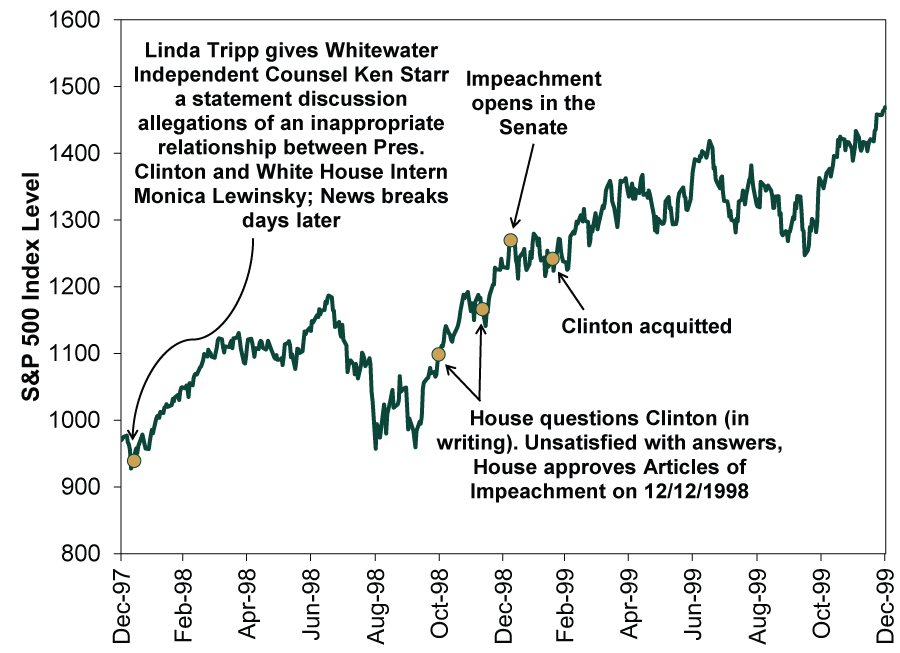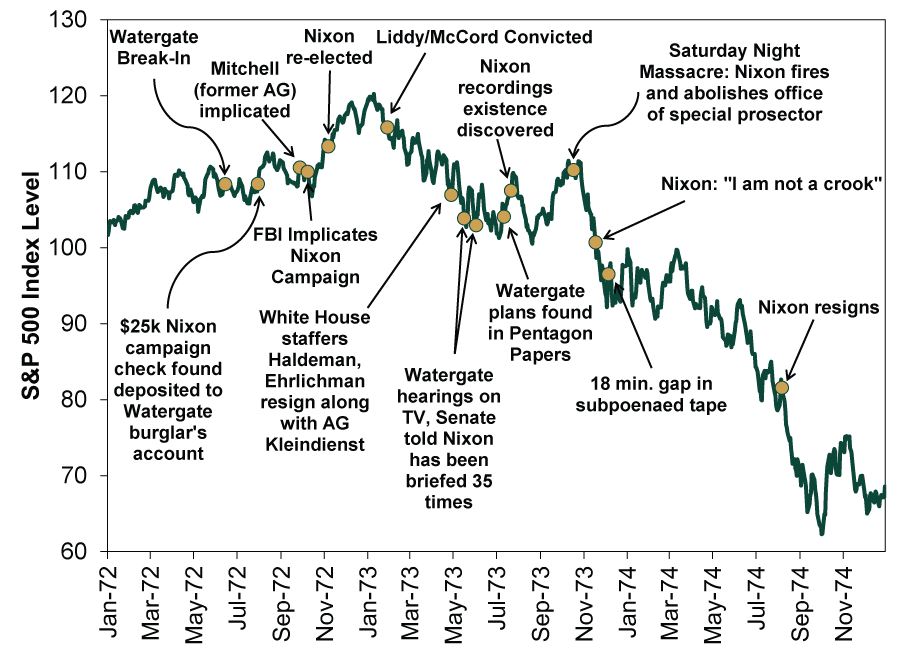Personal Wealth Management / Politics
A Refresher on Impeachment and Stock Markets
Impeachment is now official—and still not inherently bearish.
Editors’ Note: Our political commentary is intentionally nonpartisan. We favor no party nor any politician and assess developments solely for their potential market impact. We think political bias is blinding and drives many investment errors.
The House officially impeached President Trump on Wednesday evening, with the vote on two Articles of Impeachment breaking on party lines: 230 to 197 for Article I (Abuse of Power) and 229 to 198 for Article II (Obstruction of Congress).[i] That makes Trump the third American president to be impeached, joining Bill Clinton and Andrew Johnson. Richard Nixon is often lumped in too, as he resigned under threat of impeachment in 1974. We have already seen a rash of headlines warning impeachment will affect stocks, and we will probably see more as the Senate trial approaches. As we have written, however, the limited stock market data show impeachment isn’t bearish. The associated uncertainty may increase short-term volatility, but beyond that, we think impeachment is primarily significant as a potential influence on next year’s presidential contest.
We won’t weigh in on the merits of the charges or anything related to that. We don’t think today’s vote was a surprise, considering House Democrats have been telegraphing their intentions for months. We also think, given all the available information today, that it would take some unprecedented big reveal during the trial for Senators to convict and remove Trump from office. Consider: though the House impeached Clinton along partisan lines in 1998, a Republican Senate voted to keep him in office after considering all witnesses’ testimony—by a considerable margin, no less. The bar for conviction is high, and Republican Senators who have commented on the matter largely don’t seem to think that bar has been met. That could change, depending on how the trial goes, but it isn’t something anyone can forecast today.
No president has ever been removed from office. However, stocks have dealt with impeachment (whether potential or actual) twice since reliable market data begin (Johnson’s occurred decades beforehand). Exhibits 1 and 2, which we have published before, show market returns surrounding Clinton’s impeachment and Nixon’s Watergate-driven resignation.
Four months passed between the House voting to open Clinton’s impeachment inquiry and the Senate’s acquittal. During that span, the S&P 500 soared 28.2%.[ii]
Exhibit 1: S&P 500 During the Clinton Impeachment
Source: Global Financial Data, Inc., as of 5/10/2017. S&P 500 Price Index level, 12/31/1997 – 12/31/1999.
President Nixon resigned in 1974 before the House voted on impeachment. This example may seem bearish, as the market slid during most of the Watergate investigation and impeachment inquiry. (Exhibit 2) But just as the market’s torrid rise wasn’t attributable to Clinton’s impeachment, Watergate alone likely didn’t drive 1973 – 1974’s deep bear market. Nixon’s price controls and the Arab oil embargo, which combined to stoke high inflation and economic contraction, likely hit harder.
Exhibit 2: S&P 500 During Watergate Investigation
Source: Global Financial Data, Inc., as of 5/10/2017. S&P 500 Price Index level, 12/31/1971 – 12/31/1974.
We do think impeachment will probably have an impact on 2020’s election, which in turn is likely one factor influencing market returns next year. However, this isn’t actionable for investors, as it presently isn’t clear whether impeachment will help or hurt Trump, Democratic challengers or current members of Congress seeking re-election. A trial that throws Trump’s unconventional style and judgment into the national spotlight could damage his chances of re-election.
Yet impeachment could also help him, in the sense that he may see Joe Biden as his stiffest competition. The whole impeachment case centers around allegations that Trump tried to strong-arm the Ukrainian government into investigating potential corruption surrounding the appointment of Biden’s son Hunter to the board of a Ukrainian company. If he can successfully use this (whether above-board or not) to imply the Biden family has corruption issues, it could eliminate Joe Biden before the general election. Trump may think this pits him against Warren, whom he sees as more politically extreme and easier to beat. He may or may not be correct about that, but this could be his calculus. We suspect it is also why there is intense debate surrounding the potential for either Biden to be compelled to testify in a Senate trial.
Additionally, polls indicate the majority of voters don’t support impeachment, viewing it as a hyper-partisan exercise. This creates the possibility voters—especially in swing states—may choose to punish Democratic lawmakers for pursuing it. Fully 31 Democrats won their seats in 2018’s midterm election in districts that voted for Trump in 2016, suggesting to us risk of a voter rebuke over impeachment is fairly high.
The timing of a Senate trial adds another wrinkle. As we write, it is likely to occur in January, which would take Democratic presidential candidates (and Senators) Elizabeth Warren, Bernie Sanders, Cory Booker and Amy Klobuchar off the campaign trail at a critical juncture, potentially leaving an open goal for non-senator candidates like Pete Buttigieg in Iowa and other early primary states. In 2008, Barack Obama concentrated his resources on Iowa and parlayed that early victory into the nomination, despite national polls giving Hillary Clinton a massive lead at the time. If the leading candidates can’t campaign in Iowa on the eve of the caucus, a lower-polling challenger has a higher likelihood of repeating Obama’s feat.
At this point, though, any statements about this must be couched with
“may,” “could,” “might” or “possibly.” You can’t assign probabilities
to these possible outcomes. Hence, we don’t think impeachment’s impact
on 2020 should factor into investment decision-making now.
[i] Two Democrats voted against Article I and three voted against Article II. Democrat Tulsi Gabbard—a presidential candidate—voted Present on each, and one additional Democrat (and two Republicans) abstained. No Republicans voted for impeachment.
[ii] Source: FactSet, as of 10/18/2019. S&P 500 total return, 10/8/1998 – 2/12/1999.
If you would like to contact the editors responsible for this article, please message MarketMinder directly.
*The content contained in this article represents only the opinions and viewpoints of the Fisher Investments editorial staff.
Get a weekly roundup of our market insights
Sign up for our weekly e-mail newsletter.

You Imagine Your Future. We Help You Get There.
Are you ready to start your journey to a better financial future?

Where Might the Market Go Next?
Confidently tackle the market’s ups and downs with independent research and analysis that tells you where we think stocks are headed—and why.





